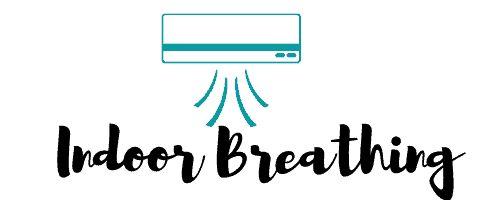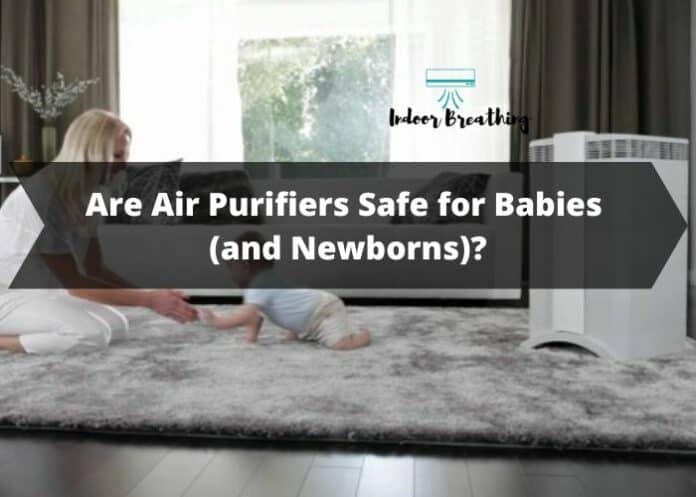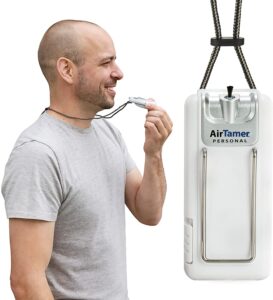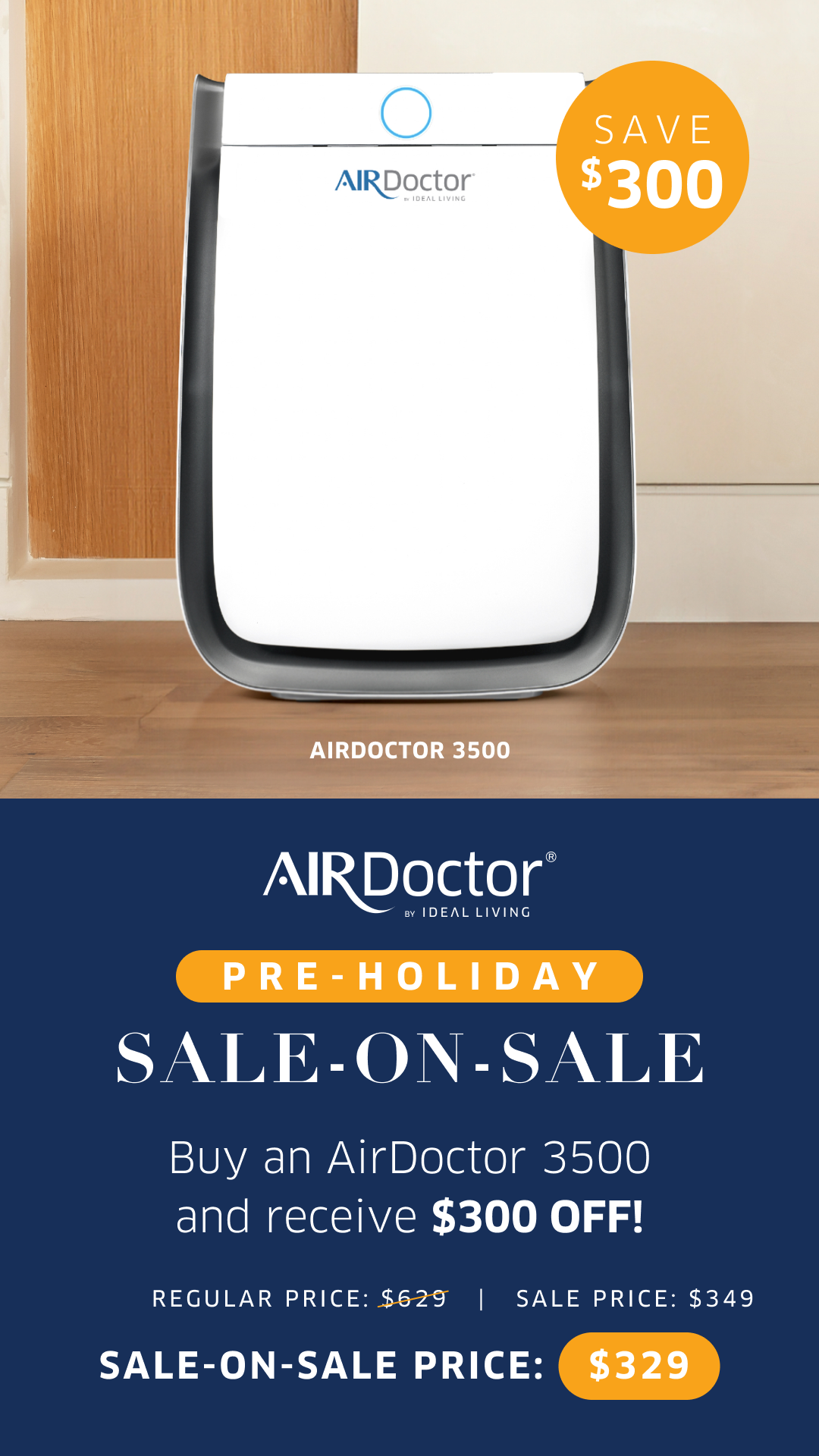Whether you have a newborn or are on the verge of becoming a parent, you must be skeptical about getting air purifiers for your home, especially due to their many chemicals. While some air purifiers are completely safe for babies, others can be incredibly harmful to them.
Since the baby’s lungs are still developing, parents must keep the air around them as clean as possible. Smoking, dust, volatile organic compounds, and harmful chemicals can all dangerously affect the baby’s sensitive lungs.
Air purifiers help eliminate all those air particles but are they safe for babies?
Table of Contents
Are Air Purifiers Safe for Babies (and Newborns)?
Yes, most air purifiers are completely safe for babies. Why most and not all? Because not all air purifiers are made the same way, some risks are involved.
Air Purifiers remove pollutants from the air, so they are not even safe but also help your baby breathe healthier air.
Why Consider an Air Purifier?
A baby’s lungs are still developing, making clean air essential for their health. Exposure to pollutants such as smoke, dust, volatile organic compounds (VOCs), and harmful chemicals can adversely affect a baby’s sensitive respiratory system. These pollutants can exacerbate conditions like asthma and allergies, leading to long-term health issues. Therefore, ensuring the air around your baby is as clean as possible is a top priority for many parents.
How Do Air Purifiers Work?
Air purifiers work by removing pollutants from the air, making it safer and healthier to breathe. They typically use filters to trap particles and sometimes incorporate technologies like ionization or UV light to kill bacteria and viruses. However, not all air purifiers are created equal, and the technology they use can determine their safety, especially around infants.
Types of Air Purifiers
- HEPA Filters: These are widely regarded as the safest and most effective type of air purifier for homes with babies. HEPA (High-Efficiency Particulate Air) filters can capture up to 99.97% of particles as small as 0.3 microns, including dust, pollen, mold spores, and pet dander. They do not produce ozone or other harmful byproducts, making them ideal for nurseries.
- Activated Carbon Filters: These are effective at removing odors and VOCs from the air. While they are safe for babies, they are often used in conjunction with HEPA filters to provide comprehensive air cleaning.
- UV-C Light Purifiers: These purifiers use ultraviolet light to kill bacteria and viruses. While they can be effective, it’s crucial to ensure they do not produce ozone, which can be harmful to a baby’s lungs.
- Ionizers: Ionizing air purifiers emit charged particles that attach to pollutants, causing them to settle out of the air. However, many ionizers produce ozone as a byproduct, which can be harmful to both babies and adults. Therefore, these should generally be avoided in homes with infants.
- Ozone Generators: These devices intentionally produce ozone to purify the air. Despite their effectiveness in eliminating certain pollutants, the ozone they generate is a lung irritant and can be particularly dangerous for babies. Ozone generators are not recommended for use around infants.
Selecting the Right Air Purifier for Your Baby
When choosing an air purifier for your baby’s room, consider the following:
- Certification: Look for purifiers that are certified by reputable organizations such as AHAM (Association of Home Appliance Manufacturers), which rates air cleaners based on their clean air delivery rate (CADR).
- Ozone-Free: Ensure the purifier does not emit ozone. Check for certifications or labels indicating the device is ozone-free.
- Size Appropriateness: Choose a purifier that is suitable for the size of the room where it will be used. A model that is too small may not effectively clean the air, while an oversized unit may be unnecessary.
When Air Purifiers Can Be Dangerous For Babies?
Air purifiers can be dangerous if you place them in the wrong places, for example, too close to your baby. Avoid that and keep the air purifier at a safe distance from your baby.
There are available air purifiers that produce ozone. As you might already be familiar with, ozone is a respiratory irritant that can cause coughing, shortness of breath, and even damage to the lungs.
Though most air purifiers that produce ozone emit a super low amount, I suggest avoiding using these in the baby’s room.
Air purifiers are generally seen as beneficial devices for improving indoor air quality, especially in homes with babies. However, they can become dangerous if not used correctly or if the wrong type is chosen. Understanding the potential risks and how to mitigate them is essential for maintaining a safe environment for your little one.
Incorrect Placement of Air Purifiers
One of the primary risks associated with air purifiers is incorrect placement. Placing an air purifier too close to your baby can be harmful. The concentrated airflow from the device can disturb your baby’s breathing or potentially introduce an excessive amount of filtered air into their immediate environment, which may be too dry or too cold.
Tips for Safe Placement:
- Distance: Keep the air purifier at a safe distance from the crib or play area. Ideally, place it at least a few feet away to ensure that the air circulation is gentle and dispersed.
- Height: Position the air purifier at a height where it can effectively circulate air without blowing directly on the baby.
Ozone-Producing Air Purifiers
Air purifiers that produce ozone are a significant concern. Ozone is a known respiratory irritant that can cause symptoms like coughing, shortness of breath, and even long-term lung damage. This is particularly dangerous for infants, whose lungs are still developing and are more sensitive to air pollutants.
While many air purifiers on the market emit only trace amounts of ozone, even low levels can be harmful to a baby. Therefore, it’s best to avoid any air purifier that produces ozone entirely.
Types to Avoid:
- Ozone Generators: These devices are specifically designed to create ozone to remove pollutants. They are not suitable for use in any household, especially where infants are present.
- Some Ionizers: Ionizing air purifiers can produce ozone as a byproduct. Always check if the model you’re considering is certified as ozone-free.
Understanding Safe Air Purifier Choices
When selecting an air purifier for a baby’s room, prioritizing safety is crucial. Here are some guidelines to help you make an informed decision:
HEPA Filters: These are the safest and most effective option for a baby’s room. HEPA (High-Efficiency Particulate Air) filters can capture 99.97% of particles, including dust, pollen, and mold spores, without emitting any harmful substances.
Activated Carbon Filters: Often used in conjunction with HEPA filters, these filters effectively remove odors and VOCs (volatile organic compounds) without producing ozone.
Avoid UV-C Light Purifiers with Ozone: While UV-C light can kill bacteria and viruses, some models may produce ozone. Ensure the model you choose is verified to be ozone-free.
Certifications: Look for air purifiers certified by reputable organizations such as the Association of Home Appliance Manufacturers (AHAM), which can guarantee the device’s safety and effectiveness.
Do Air Purifiers Help Babies Sleep?
Clean air is fundamental for healthy living and quality sleep. For adults and babies alike, breathing in air free from pollutants, allergens, and other contaminants is crucial for overall health and well-being. Poor air quality can lead to various respiratory issues, which in turn can disrupt sleep. Babies, with their developing respiratory systems, are particularly sensitive to airborne contaminants such as dust, pollen, pet dander, mold spores, and volatile organic compounds (VOCs).
How Air Purifiers Improve Air Quality
Air purifiers work by drawing in air and passing it through filters to remove harmful particles and pollutants. High-efficiency particulate air (HEPA) filters, commonly used in air purifiers, are capable of capturing up to 99.97% of particles as small as 0.3 microns. This includes many common allergens and pollutants that can disrupt sleep. Some advanced air purifiers also feature activated carbon filters that remove odors and VOCs, further enhancing the air quality.
Benefits of Air Purifiers for Babies
- Reduced Allergens: Babies are particularly vulnerable to allergens like dust mites, pet dander, and pollen. These can cause allergic reactions, leading to discomfort and disrupted sleep. By removing these particles from the air, air purifiers can help minimize allergic reactions and promote uninterrupted sleep.
- Protection from Respiratory Issues: Poor air quality can exacerbate conditions like asthma and cause respiratory infections, which are common in infants. An air purifier can significantly reduce the presence of irritants, thereby protecting your baby from respiratory issues and helping them breathe easier, leading to better sleep.
- Elimination of Odors: Strong odors can disturb a baby’s sleep. Air purifiers equipped with activated carbon filters can effectively remove unpleasant smells, creating a more pleasant and conducive environment for sleep.
- Improved Overall Health: Consistent exposure to clean air supports better respiratory health, which is crucial for a baby’s growth and development. Healthy babies are more likely to sleep well and for longer durations, which is beneficial for their overall development.
Creating an Optimal Sleep Environment
To maximize the benefits of an air purifier, place it in the room where your baby sleeps. Ensure it is appropriately sized for the room to effectively circulate and purify the air. Regular maintenance, such as changing filters according to the manufacturer’s recommendations, is essential to keep the air purifier functioning optimally.
Additionally, consider other aspects of creating a good sleep environment, such as maintaining a comfortable room temperature, using a white noise machine to mask disruptive sounds, and keeping the sleeping area free from clutter and dust.
Benefits of Air Purifiers for Babies or Newborns
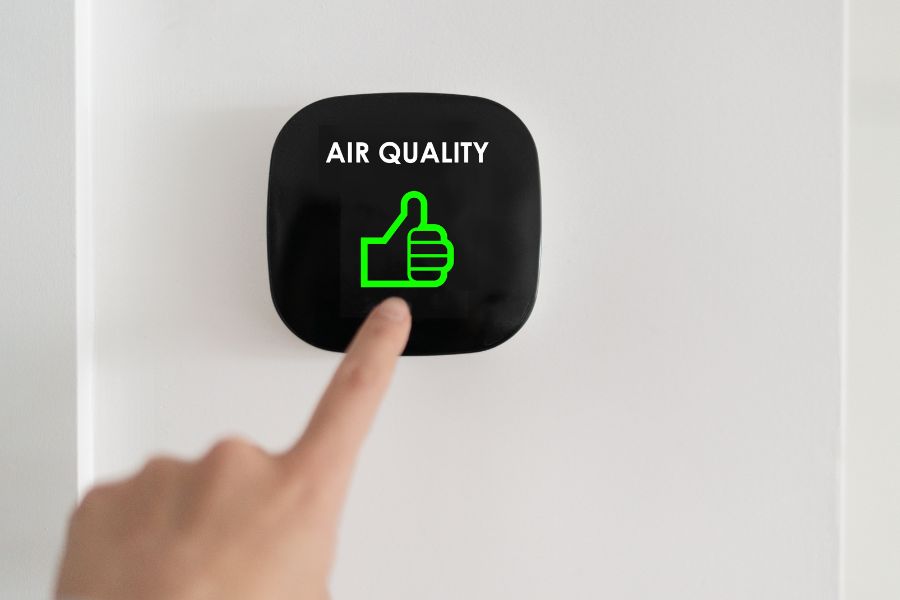
The lungs of newborns or babies, in general, are developing. Their smaller lung capacity leads to higher air intake than adults, and they are prone to infections and allergic reactions.
One can never know the number of bacteria, molds, viruses, and other allergens floating in the house. The air inside the house could even be more polluted than the outside. This is because homes are airtight, and once any pollutant enters, it’s hard to escape.
Unfortunately, nurseries and children’s rooms are at high risk because of the airborne contaminants that new parents bring into the room.
The crucial benefit that an air purifier offers to your baby is protection from pollen, viruses, bacteria, volatile organic compounds, pet dander, smoke, mold spores, odor particles, dust, and other such particles.
The lungs of newborns and babies are still developing, which makes them particularly vulnerable to the air they breathe. With a smaller lung capacity, they inhale more air relative to their body size compared to adults. This increased air intake means they are more susceptible to infections and allergic reactions caused by airborne contaminants.
The air quality inside a home can often be more polluted than the air outside. Modern homes are designed to be airtight, which, while energy-efficient, also traps pollutants indoors. Bacteria, molds, viruses, and other allergens can linger in the air, posing a significant risk to everyone, especially young children. Nurseries and children’s rooms are particularly at risk because new parents often unknowingly bring in airborne contaminants.
The Role of Air Purifiers
Air purifiers offer a crucial line of defense against a variety of airborne pollutants. These devices can help remove pollen, viruses, bacteria, volatile organic compounds (VOCs), pet dander, smoke, mold spores, odor particles, dust, and other harmful particles from the air. By using an air purifier, parents can create a safer breathing environment for their baby, leading to several important health benefits.
Health Benefits of Using an Air Purifier for Your Baby
- Fewer Headaches: Clean air can reduce the frequency and severity of headaches by removing airborne irritants that can trigger these symptoms.
- Reduced Allergies: By filtering out common allergens such as pollen, dust mites, and pet dander, air purifiers can significantly reduce allergy symptoms.
- Lower Chances of Developing Respiratory Dysfunction: Exposure to clean air helps protect against respiratory issues by removing pollutants that can cause or exacerbate conditions like bronchitis or asthma.
- Lower Chances of Developing Asthma or Bronchitis: Children who breathe cleaner air are less likely to develop chronic respiratory conditions, as air purifiers remove many of the particles that can trigger these illnesses.
- Lower Chances of Developing Cancer from Exposure to Harmful Chemicals: Air purifiers can remove VOCs and other harmful chemicals from the air, reducing the risk of long-term exposure that could lead to cancer.
Which Air Purifier Is Best For Newborns?
The best are those who work and can clean harmful airborne particles. The best are air purifiers that use fans and filters to trap particles. So next, you should check what kind of filters they use because not all are good.
Then you can look at other parameters such as noise level, size, design, energy consumption, etc.
Choosing the best air purifier for a newborn is crucial to ensuring a safe and healthy environment for your baby. Newborns are particularly sensitive to airborne particles, allergens, and pollutants, which can affect their developing respiratory systems. Here’s a comprehensive guide on what to look for in an air purifier and recommendations for the best ones on the market.
Key Features of an Effective Air Purifier for Newborns
1. HEPA Filters
High-Efficiency Particulate Air (HEPA) filters are essential for trapping small particles, including dust, pollen, pet dander, and even some bacteria and viruses. When choosing an air purifier for your newborn, ensure it has a true HEPA filter, which can capture particles as small as 0.3 microns with 99.97% efficiency.
2. Activated Carbon Filters
In addition to a HEPA filter, a good air purifier for newborns should include an activated carbon filter. This filter helps to remove odors, volatile organic compounds (VOCs), and harmful gases from the air, providing a cleaner and fresher environment.
3. Low Noise Levels
Newborns need a quiet environment to sleep peacefully. Look for air purifiers with low noise levels, preferably below 50 decibels (dB). Some air purifiers come with a ‘sleep mode’ that reduces the noise level further during nighttime operation.
4. Appropriate Room Size Coverage
Ensure the air purifier you choose is suitable for the size of the room where your newborn sleeps. Check the Clean Air Delivery Rate (CADR) and the manufacturer’s recommended room size to ensure optimal performance.
5. Energy Efficiency
Air purifiers can run continuously, so energy consumption is an important factor. Look for models that are Energy Star certified, which ensures they use less energy without compromising performance.
6. Design and Safety Features
Since the air purifier will be in a room with a newborn, it’s important that it has a child-safe design. Features such as a lockable control panel, no sharp edges, and a stable base can help ensure the safety of your baby.
Recommended Air Purifiers for Newborns
1. Coway AP-1512HH Mighty Air Purifier
The Coway AP-1512HH is a popular choice for its efficient four-stage filtration system, which includes a pre-filter, deodorization filter, true HEPA filter, and a vital ionizer. It’s designed for rooms up to 361 square feet and operates quietly, making it ideal for a nursery.
2. Honeywell HPA300 True HEPA Air Purifier
The Honeywell HPA300 is known for its powerful HEPA filtration, which captures up to 99.97% of airborne particles. It covers large rooms up to 465 square feet and has adjustable cleaning levels, including a quiet setting for nighttime use.
3. LEVOIT Core 300 Air Purifier
The LEVOIT Core 300 offers excellent performance in a compact design. It features a three-stage filtration system with a true HEPA filter and an activated carbon filter. It’s suitable for rooms up to 219 square feet and operates at a noise level as low as 24 dB, perfect for ensuring a peaceful sleep environment.
4. Blueair Blue Pure 211+
The Blueair Blue Pure 211+ is highly effective in removing airborne pollutants with its combination of mechanical and electrostatic filtration. It’s designed for larger rooms up to 540 square feet and has a simple, user-friendly interface. Its low noise level and energy efficiency make it a great option for a baby’s room.
I have an article about the best air purifiers for babies and how to choose one, so give it a read.
How About Air purifier Necklace For Baby?
What Is the Use Of Air Purifier Necklace?
Air purifier necklaces use electrostatic technology similar to air purifiers with ionizers. Negative ions from the necklace force harmful airborne particles to move away from you.
Are Necklace Air Purifiers True?
Necklace air purifiers can’t provide protection against viruses and bacteria. They can even be more harmful than good. Because the negative ions necklace air purifiers emit can also interact with other molecules in the air. That can cause health issues.
Should You Use Air Purifier Necklace for Baby?
No. Necklace air purifiers do more harm than good, especially for babies and older people.
Final Thoughts
Based on the above discussion, it can be safely concluded that most air purifiers are safe for babies, given that they do not include harmful ozone-emitting filters.
If you’re making a purchase soon, look for air purifiers that offer the true HEPA and activated carbon filters. These two filters offer the same quality and purifying feature but are safely and effectively suitable for babies.
Based on the above discussion, it can be safely concluded that most air purifiers are safe for babies, given that they do not include harmful ozone-emitting filters. Air quality is crucial, especially in nurseries and children’s rooms, where infants spend a significant amount of time. The right air purifier can help mitigate allergens, pollutants, and other harmful particles, creating a healthier environment for your baby.
When selecting an air purifier, it’s essential to choose one that combines safety with effectiveness. The ideal choice includes models equipped with true HEPA and activated carbon filters. These filters are renowned for their superior air purifying capabilities and safety for all users, including infants.
True HEPA (High-Efficiency Particulate Air) filters are designed to capture 99.97% of particles as small as 0.3 microns, including dust, pollen, mold spores, and pet dander. This high level of efficiency ensures that the air your baby breathes is as clean as possible. True HEPA filters are particularly beneficial in households with pets or where family members have allergies, as they effectively trap common allergens.
Activated Carbon Filters
Activated carbon filters complement the HEPA filter by targeting gases and odors. These filters contain a form of carbon that has been treated to be extremely porous, allowing it to adsorb volatile organic compounds (VOCs), smoke, and unpleasant odors. This is particularly useful in maintaining a fresh-smelling nursery and protecting your baby from harmful chemical fumes.
Avoid Ozone-Emitting Filters
While some air purifiers use ozone to eliminate odors and bacteria, these should be avoided in homes with babies. Ozone can irritate the lungs and respiratory system, which is especially concerning for infants whose bodies are still developing. Ensuring your chosen air purifier does not produce ozone is crucial for maintaining a safe environment.
Making the Right Choice
When purchasing an air purifier for your baby’s room, prioritize models that feature true HEPA and activated carbon filters. These types of filters provide a dual-action approach to air purification, ensuring comprehensive removal of both particulate matter and gaseous pollutants without producing harmful byproducts.
In conclusion, selecting the right air purifier involves careful consideration of filter types and their safety profiles. By opting for air purifiers equipped with true HEPA and activated carbon filters, you can create a safe, clean, and healthy environment for your baby, giving you peace of mind and ensuring your little one breathes easy.
